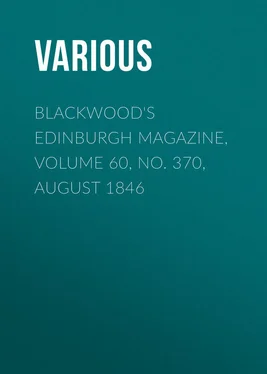Various - Blackwood's Edinburgh Magazine, Volume 60, No. 370, August 1846
Здесь есть возможность читать онлайн «Various - Blackwood's Edinburgh Magazine, Volume 60, No. 370, August 1846» — ознакомительный отрывок электронной книги совершенно бесплатно, а после прочтения отрывка купить полную версию. В некоторых случаях можно слушать аудио, скачать через торрент в формате fb2 и присутствует краткое содержание. Издательство: Иностранный паблик, Жанр: periodic, foreign_edu, Путешествия и география, на английском языке. Описание произведения, (предисловие) а так же отзывы посетителей доступны на портале библиотеки ЛибКат.
- Название:Blackwood's Edinburgh Magazine, Volume 60, No. 370, August 1846
- Автор:
- Издательство:Иностранный паблик
- Жанр:
- Год:неизвестен
- ISBN:нет данных
- Рейтинг книги:3 / 5. Голосов: 1
-
Избранное:Добавить в избранное
- Отзывы:
-
Ваша оценка:
- 60
- 1
- 2
- 3
- 4
- 5
Blackwood's Edinburgh Magazine, Volume 60, No. 370, August 1846: краткое содержание, описание и аннотация
Предлагаем к чтению аннотацию, описание, краткое содержание или предисловие (зависит от того, что написал сам автор книги «Blackwood's Edinburgh Magazine, Volume 60, No. 370, August 1846»). Если вы не нашли необходимую информацию о книге — напишите в комментариях, мы постараемся отыскать её.
Blackwood's Edinburgh Magazine, Volume 60, No. 370, August 1846 — читать онлайн ознакомительный отрывок
Ниже представлен текст книги, разбитый по страницам. Система сохранения места последней прочитанной страницы, позволяет с удобством читать онлайн бесплатно книгу «Blackwood's Edinburgh Magazine, Volume 60, No. 370, August 1846», без необходимости каждый раз заново искать на чём Вы остановились. Поставьте закладку, и сможете в любой момент перейти на страницу, на которой закончили чтение.
Интервал:
Закладка:
Various
Blackwood's Edinburgh Magazine, Volume 60, No. 370, August 1846
THE ARMY. 1 1 Notes and Recollections of a Professional Life. By the late Wm. Fergusson, M.D., Inspector-General of Military Hospitals. Longmans: 1846. The Military Miscellany. By Henry Marshall, F.R.S.E., Deputy Inspector-General of Army Hospitals. Murray: 1846.
When we glance back at the bright page of British military history, so thickly strewn with triumphs, so rarely checkered by a reverse, it seems paradoxical to assert that the English are not a military nation. Such, nevertheless, is the case. Our victories have been the result of no especial fitness for the profession of arms, but of dauntless spirit and cool stubborn courage, characterising the inhabitants of the narrow island that breeds very valiant children. Mere bravery, however heroic, does not of itself constitute an aptitude for the soldier's trade. Other qualities are needful – qualities conspicuous in many European nations, but less manifest in the Englishman. Naturally military nations are those of France, the Highlands of Scotland, Poland, and Switzerland – every one of them affording good specimens of the stuff peculiarly fitted for the manufacture of soldiers. They all possess a martial bent, a taste for the military career, submitting willingly to its hardships and privations, and are endowed with a faculty of acquiring the management of offensive weapons, with which for the most part they become acquainted early in life. A system of national conscription, like that established in many continental countries, is the readiest and surest means of giving a military tone to the character of a people, and of increasing the civil importance and respectability of an army. But without proceeding to so extreme a measure, other ways may be devised of producing, as far as is desirable, similar results.
We appeal to all intelligent observers, and especially to military men, whom travel or residence upon the Continent have qualified to judge, whether in any of the great European states the soldier has hitherto obtained so little of the public attention and solicitude as in England? Whether in any country he is so completely detached from the population, enjoying so little sympathy, in all respects so uncared for and unheeded by the masses, and, we are sorry to say it, often so despised and looked down upon, even by those classes whence he is taken? Let war call him to the field, and for a moment he forces attention: his valour is extolled, his fortitude admired, his sufferings are pitied. But when peace, bought by his bravery and blood, is concluded, what ensues? Houses of Parliament thank and commend him, towns illuminate in honour of his deeds, pensions and peerages are showered upon his chiefs, perhaps some brief indulgence is accorded to himself; but it is a nine days' wonder, and those elapsed, no living creature, save barrack masters, inspecting officers, and Horse-guards authorities, gives him another thought, or wastes a moment upon the consideration of what might render him a happier and a better man. Like a well-tried sabre that has done its work and for the present may lie idle, he is shelved in the barrack room, to be occasionally glanced at with pride and satisfaction. Hilt and scabbard are, it is true, kept carefully polished – drill and discipline are maintained; but insufficient pains are taken to ascertain whether rust corrodes the blade, whether the trusty servant, whose achievements have been so glorious and advantageous, does not wear out his life in discouragement and despondency. But this state of things, we hope and believe, is about to change. We rejoice to see a daily increasing disposition on the part of English legislators and of the English nation, to investigate and amend the condition of their gallant defenders. If war is justly considered the natural state of an army, 2 2 Sir Charles Napier.
peace, on the other hand, is the best time to moot and discuss measures likely to raise its character and increase its efficiency.
We do not fear to be accused of advocating change for its own sake, or what is vulgarly nicknamed Reform, in any of the institutions of this country, whether civil or military. But we rejoice at the appearance of books calculated to direct attention, we will not say to the abuses of the army, but to its possible improvement. And we know no class of men better qualified to write such books than army surgeons, whose occupations, when attached to regiments, bring them of necessity into more frequent contact with a greater variety of men, and to a more intimate acquaintance with the soldier's real character and feelings, than the duties of field or company officers in our service either exact or permit.
"To obviate the reproaches I may encounter for presuming to write upon subjects altogether military, I may be allowed to state, that during a quarter of a century that I served with the armies of the country, I officiated as surgeon of three different regiments in different parts of the world. I embarked nine times from the shores of Britain with armaments on foreign expeditions, and out of twenty-four years' actual service, (for the year of the peace of Amiens has to be deducted,) I spent seventeen years, or parts of them, in other climates, passing through every grade of medical rank, in every variety of service, even to the sister service of the navy." – Dr. Fergusson. Preface.
These are the men, or we greatly err, to write books about the army. They may not be conversant with tactics in the field, although even of those, unless they wilfully shut both eyes and ears, they can hardly avoid acquiring some knowledge. But on other matters connected with soldiers and armies, they must be competent to speak, and should be listened to as authorities. We look upon Dr Fergusson's testimony, and upon the information – the result of his vast experience – which he gives us in concise form and plain language, as most valuable; although some of the changes he suggests have been accomplished, wholly or partially, since his book was written. Mr Marshall's opportunities of personal observation have, we suspect, been less extensive; but to atone for such deficiency, he has been a diligent reader, and he places before us a host of military authorities, references and statistical tables. The value of his authorities may, perhaps, here and there be questioned; and he sometimes gives, in the form of extracts, statements unauthenticated by a name, but of which he does not himself seem to accept the responsibility. Nevertheless, his book has merit, and is not unlikely to accomplish both the objects proposed by its author, – namely, "to supply some information respecting the constitution, laws, and usages of the army, and to excite attention to the means which may meliorate the condition of soldiers, and exalt their moral and intellectual character."
These are three measures whose adoption would, we fully believe, elevate the character of the British soldier, increase his self-respect and willingness to serve, and, consequently, his efficiency in the field and good conduct in quarters. They will not be thought the worse of, we are sure, because they would assimilate the organization of our army to that of certain foreign services. The day is gone by when prejudice prevented Englishmen from adopting improvements, merely because they were based upon foreign example. The measures referred to, and whose adoption we would strenuously urge, are – first, the enlistment of soldiers for limited periods only; secondly, the total abolition of corporal punishment; thirdly, the increase of rewards, and especially a gradual and cautious augmentation of the number of commissions given to non-commissioned officers. Be it understood that we recommend these changes collectively, and not separately. They hinge upon each other, particularly the two last; and if one of them be refused, the others may require modification.
Читать дальшеИнтервал:
Закладка:
Похожие книги на «Blackwood's Edinburgh Magazine, Volume 60, No. 370, August 1846»
Представляем Вашему вниманию похожие книги на «Blackwood's Edinburgh Magazine, Volume 60, No. 370, August 1846» списком для выбора. Мы отобрали схожую по названию и смыслу литературу в надежде предоставить читателям больше вариантов отыскать новые, интересные, ещё непрочитанные произведения.
Обсуждение, отзывы о книге «Blackwood's Edinburgh Magazine, Volume 60, No. 370, August 1846» и просто собственные мнения читателей. Оставьте ваши комментарии, напишите, что Вы думаете о произведении, его смысле или главных героях. Укажите что конкретно понравилось, а что нет, и почему Вы так считаете.












